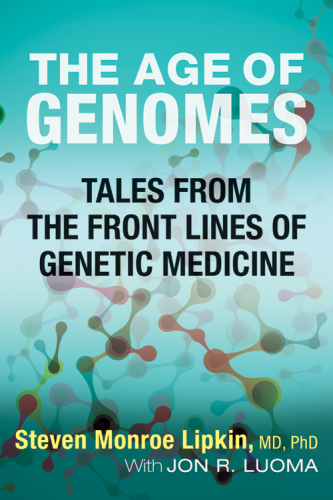
The Age of Genomes
Tales from the Front Lines of Genetic Medicine
داستانهایی از خطوط مقدم پزشکی ژنتیکی:
کتاب های مرتبط
- اطلاعات
- نقد و بررسی
- دیدگاه کاربران
نقد و بررسی

April 15, 2016
Vignettes from the front lines of genetics research and testing.Lipkin is a clinical geneticist, the go-to specialist for those worried sick about family medical history but also, the worried well who want to live better/longer and, consequently, get their genomes sequenced. They search for mutated genes that indicate risk for, or cause of, an overt disease, and the hope is that the gene can be remedied. That is the case for the author's first story, about Gaucher disease, a recessive genetic disease caused by a missing enzyme needed to eliminate fatty cellular trash that accumulates in immune cells in the spleen. The enzyme is now commercially synthesized, saving the lives of those who inherited two copies of the defective gene. Lipkin also tells the personal stories of patients diagnosed with mutated genes that cause other rare diseases, as well as more common diseases like Alzheimer's and some forms of cancer. Readers may not remember which gene causes which malady, but they will empathize with Lipkin's patients, most of whom are motivated to do whatever they can to mitigate their disease risk. Along the way, the author discusses advanced reproductive technologies and pre-implantation genetic diagnosis to weed out embryos with mutated genes--which may not be necessary since not all mutated genes are 100 percent penetrant. Other points of discussion include the effects of diagnosis when there is no treatment, the problem of incidental findings, which can lead to unnecessary treatments, and the prospect of eliminating hereditary disease by screening prospective couples for carrier status, as has been done to reduce the incidence of Tay-Sachs disease among Jewish couples. Lipkin also discusses genetic fingerprinting in criminal cases and retrospective diagnoses--e.g., did Abraham Lincoln have Marfan syndrome? The author's caveats about present and future uses of gene sequencing reflect a physician keenly aware of the ethical and moral issues.
COPYRIGHT(2016) Kirkus Reviews, ALL RIGHTS RESERVED.

May 1, 2016
Clinical geneticist and physician Lipkin, with science writer Loupa, unspools the emergent and controversial field of genomics in this diverse selection of case studies. As genetic testing gets cheaper and more accessible to average people, Lipkin equips potential patients with an evenhanded assessment of the power and consequences their DNA holds. Cautionary tales abound, like that of the woman who wanted testing for ovarian cancer and planned on preemptive surgery but was surprised and disturbed to learn she was instead at risk for Parkinson's. Lipkin is emphatic that genetics are not a panacea and can be abused, misunderstood, or used to discriminate, as they were in the eugenics movement of the early twentieth century and Nazi Germany. The book works best when Lipkin tells stories of specific patients and rare disorders he encounters but also gets bogged down in unpronounceable medical terms and acronyms that most readers will be tempted to breeze over. But those interested in the Human Genome Project or their own medical history will find something fascinating.(Reprinted with permission of Booklist, copyright 2016, American Library Association.)

























دیدگاه کاربران